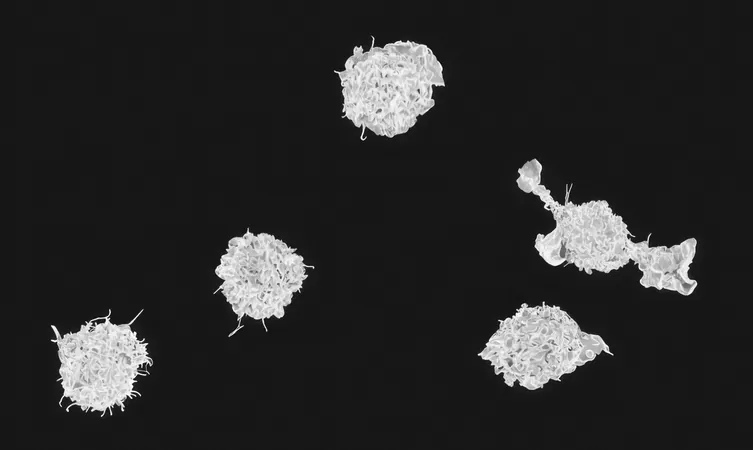
Groundbreaking Discovery: How Immune Cells Halt Deadly Metastatic Cancer Spread!
2024-10-07
Author: Ming
Groundbreaking Discovery: How Immune Cells Halt Deadly Metastatic Cancer Spread!
Metastatic cancer, known for its ruthless ability to spread from the original tumor to distant sites in the body, remains the leading cause of cancer-related deaths. Despite significant advances in cancer research, the mystery behind why certain cancer cells can lie dormant for years, or even decades, while others swiftly establish new tumors has baffled scientists.
Recent findings from the Montefiore Einstein Comprehensive Cancer Center (MECCC) reveal a remarkable natural immune mechanism that appears to keep cancer cells in check. This crucial study, published in the prestigious journal Cell, sheds light on the role that specialized immune cells play in thwarting the development of metastases.
Hope on the Horizon: New Therapies May Be Possible!
Dr. Julio Aguirre-Ghiso, the leader of the research team and director of MECCC's Cancer Dormancy Institute, emphasizes the importance of these findings in the battle against cancer. "Preventing or curing metastases is perhaps the most critical challenge in oncology," he states, adding that their discovery could pave the way for innovative therapies aimed at either preventing or treating metastatic disease.
Understanding Dormant Cancer Cells
The research highlights the intriguing behavior of disseminated cancer cells (DCCs)—cells that migrate from primary tumors. While some of these DCCs aggressively form new tumors, others enter a resting phase known as dormancy. Dr. Aguirre-Ghiso points out that this phenomenon has long puzzled researchers until now.
In a series of experiments using mouse models of metastatic breast cancer, the team found that when DCCs reach the lungs' air sacs, or alveoli, they are kept dormant by specialized immune cells called alveolar macrophages. These cells are crucial in the immune system's first line of defense, and it turns out, they play a vital role in regulating cancer cell behavior as well.
A New Role for Alveolar Macrophages
"Alveolar macrophages are like the guardians of the lungs. They not only fight off bacteria and environmental toxins but also interact with DCCs," explains Dr. Aguirre-Ghiso. These immune cells release a protein, TGF-β2, which sends signals to the cancer cells, ensuring they remain in their dormant state and do not activate to form deadly tumors.
In their groundbreaking study, the researchers also discovered that without these key immune cells, there was a significant uptick in activated DCCs and eventual metastasis in the lungs. This confirms the pivotal role of alveolar macrophages in keeping potentially dangerous cancer cells dormant.
A Broader Implication for Cancer Treatment?
What's particularly exciting about this discovery is the implication it has for potential treatment strategies. Since every organ in the body contains its own unique set of macrophages, the mechanisms that regulate DCCs in the lungs could be occurring in other areas of the body as well. "Our study is the first of its kind to showcase how these specialized macrophages actively induce dormancy in cancer cells," Dr. Aguirre-Ghiso notes, hinting at a broader approach to treating metastatic cancer.
As the research progresses, there’s hope that targeting these immune pathways could become a game-changer in cancer therapy, giving rise to treatments that not only combat active cancer but prevent its insidious spread.
In summary, this pioneering study not only uncovers an essential function of immune cells in fighting off metastatic disease but also opens doors to innovative therapeutic approaches that could save countless lives. Stay tuned for more updates as this exciting field of research unfolds!





 Brasil (PT)
Brasil (PT)
 Canada (EN)
Canada (EN)
 Chile (ES)
Chile (ES)
 España (ES)
España (ES)
 France (FR)
France (FR)
 Hong Kong (EN)
Hong Kong (EN)
 Italia (IT)
Italia (IT)
 日本 (JA)
日本 (JA)
 Magyarország (HU)
Magyarország (HU)
 Norge (NO)
Norge (NO)
 Polska (PL)
Polska (PL)
 Schweiz (DE)
Schweiz (DE)
 Singapore (EN)
Singapore (EN)
 Sverige (SV)
Sverige (SV)
 Suomi (FI)
Suomi (FI)
 Türkiye (TR)
Türkiye (TR)